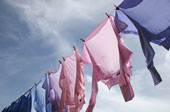
and sizes.
So you’ve been given the task of buying business shirts for your company or organisation. Where should you start?
Firstly, take your “retail shopping hat off”. You are not buying shirts just for yourself, you are buying uniforms for a team of people. So the shirts you choose must come in a range of sizes to suit different body shapes. If you have men and women, the shirts should come in matching or complementing styles. Most importantly, they must be practical to maintain and to look after. After all, there’s not much point having a uniform unless they look professional.
One of the first things potential uniform buyers often say to us is that “we want cotton”. Now I love wearing cotton shirts myself so I know where they’re coming from. But hold on, I know that cotton shirts require ironing and a higher level of care than polyester blend shirts. This is not a problem for me because I have a wonderful mother-in-law that does our ironing. Is this the case for your staff or will they turn up to work looking wrinkled and dishevelled?

easier than polyester blends.
Cotton also fades faster than polyester blends. Fading doesn’t tend to be as noticeable for light coloured fabrics but can be quite noticeable for dark coloured fabrics so if you choose black cotton shirts for a café, you’ll find your staff’s shirts might appear both wrinkled and faded after repeated washing. Polyesters blends hold their colour much better than cotton. Modern polyester blends are also easier to care for because they are quick drying and easy to iron, so try to have an open mind about these fabrics when shopping for your uniforms.
We have some customers that expect their uniforms to last for years. You may have shirts in your own wardrobe that still look great after many years but how often do you wear them? Once a week, once a month, once a season? If you only allocate a couple of shirts to each staff member, and they are expected to wear them five days per week, these shirts may be washed and worn a hundred times a year! So consider allocating more shirts to each person in the first place and/or replacing them when they start to look tired.
Whilst it is not always true, I mostly find you get what you pay for. For example, in our budget range of women’s business shirts we have a style called the Metro Stretch. This is a popular style in a wide range of colours and sizes. In our premium range of women’s business shirts we have another popular style called the Ezylin which sells at $20 higher than the Metro Stretch. Over time our Ezylin shirt will easily outperform the Metro Stretch shirt so you may actually save money by purchasing the more expensive shirt. So if your business has a high staff turnover, then it may be appropriate to buy budget priced shirts. On the other hand, if you have low staff turnover, then it is may be better to invest in premium quality shirts because they will generally last longer.

colours better than cotton.
Finally, your shirts will be branded with your logo, usually via embroidery so you need to think about shirt colours that will complement your logo. You also have to consider shirt colours that best suit your industry or workplace. The banking and finance sector often choose light blue shirts because blue shades inspire trust and security. Cafes and restaurants often choose black because dark shades look sharp and can help to hide spills and food stains.
Hopefully I’ve given you a few tips to make your task easier and some pitfalls to avoid. Good luck with your uniform buying assignment!
View our latest range of business shirts for men.
View our latest range of business shirts for women.
(written by Andrew Robinson)
